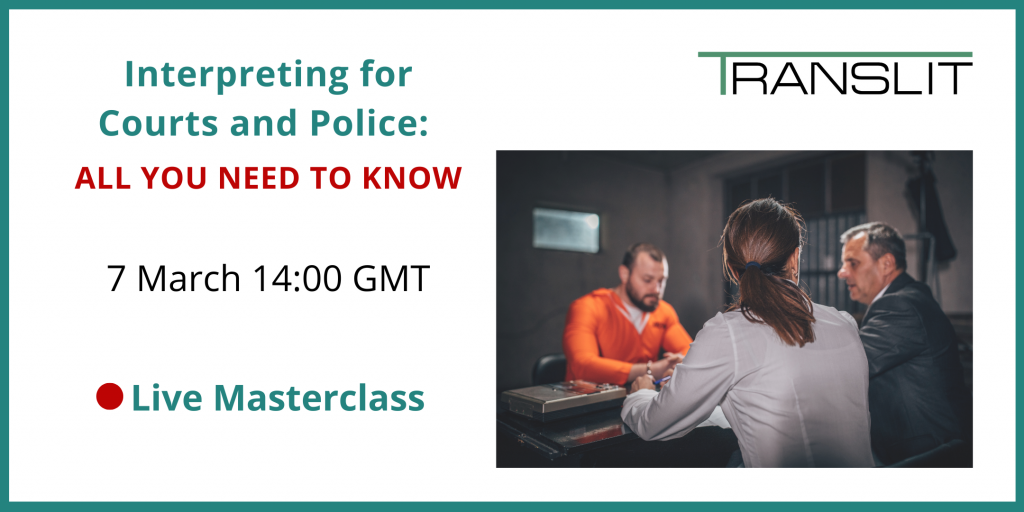=====================================================
This masterclass will be presented by lawyer linguist Sue Leschen who has 22 years (and ongoing!) experience in legal interpreting.
Who is this webinar for?
This webinar will be of benefit to anyone who currently works as a legal interpreter as well as:
- Anyone who is interested in finding out about a career in this area
- DPSI Law exam candidates
- New and experienced legal interpreters looking to brush up their skills and knowledge – or who simply want to network with their colleagues
- All those working with legal interpreters such as lawyers, police officers and magistrates, charity and legal advice case workers
What will be covered:
We will discuss what to expect during an assignment, how to prepare for it and what practical considerations you need to keep in mind.
What to expect:
Attending and understanding what happens at various legal venues:
- Crown (Circut*) Courts, County Courts, Family Courts and Magistrates (District*) Courts, Special Criminal Courts*
- Police (Garda*) stations
- Solicitors’ offices and Barristers’ chambers
- Law centres, charities and advice agencies
Knowing who you may be working with:
- Lawyers: solicitors and barristers
- Judges and Magistrates
- Police officers (Garda*), Probation Officers and Social workers
- Home Office and Border Force officers
[NB: * refers to Ireland]
How to prepare for an assignment:
Learn how to prepare your terminology, check your understanding of the subject matter and legal procedure
- Legal dictionaries and glossaries
- Reading any relevant documents: witness statements, expert reports
- Checking qualifications and competence in the subject area; theft, cyber fraud, trafficking
- Checking understanding of procedure at the venue: trial or committal hearing?
Important practical considerations:
- How and where to get these jobs?
- Getting there, your ID and dress code
- Claim form to be signed or invoice needed?
- Checking out who is your client; minors, mental health patients, engineers
- Organising your diary and other work whilst at this job
Certification:
You will receive an Attendance Certificate
=========================
YOUR PRESENTER:
TRANSLIT Pro is delighted to welcome our guest speaker, Sue Leschen, to present this masterclass.
SUE LESCHEN is an entrepreneurial lawyer linguist who has successfully married her twin passions of law and languages. Her company Avocate Legal and Business French Interpreting and Translation Services Ltd is based in Manchester, UK.
Sue is a member of the CIOL Interpreting Division Steering Group and holds Chartered Linguist (Interpreter) status.
Sue sits on the Professional Conduct Committee of the National Registers of Communication Professionals working with Deaf and Deaf-Blind Persons.
Sue is also an active member of both the Association of Police and Court Interpreters (APCI) and also of the Association of Interpreters and Translators (AIT).
Sue supports the use of properly qualified and prepared, insured and security-checked interpreters.

